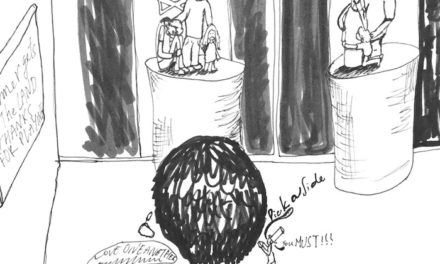To All of Emory’s faculty, staff and students:
It has been a little over a month since we, the graduate students of Emory’s Department of Spanish and Portuguese, learned of the suspension of admissions to our graduate program, as well as to Economics and the Institute of Liberal Arts, and the closing of the Departments of Visual Arts, Educational Studies and Physical Education.
This news took us aback and produced a wave of shock, concern and hurt throughout the Emory community.
After participating in various meetings and discussions and gathering information about the official reasoning for the cuts, we have written this open letter in order to, first, voice our concern for the future of the humanities at Emory University.
Secondly, we wish to express our bewilderment regarding the reasoning given by the administration for the suspension of admissions to our graduate program.
Thirdly, we want to express our genuine solidarity with the other departments that have been affected by the recent cuts made by the administration.
In the letter distributed to the Emory College on Sept. 14, Dean Forman explained that these decisions were motivated by an effort to “increase our investment in our current areas of scholarly and educational distinction,” which he specified as programs that “are essential for a twenty-first century liberal arts education.”
He characterized these areas and programs as contributing to “the study of health, quantitative theory and methods, and questions of how communities struggle with difference.” Shortly after the announcement, President Wagner informed the Emory News Center that Dean Forman’s decision affirmed the College’s commitment to “canonical disciplines within the humanities – including English, history, philosophy and religion – along with the full range of social and natural sciences.”
Given the makeup of the national and local community in which we are located and engaged, the graduate students of our department find it offensive and profoundly misinformed to suggest that our work is not “essential” or “canonical” and that it does not contribute to “questions of how communities struggle with difference.”
In response to these statements, we would like to point out that Latinos are now the largest minority population in the United States as well as the largest immigrant group in Atlanta.
The 2010 United States Census states that Latinos make up over 10 percent of the population in Atlanta, meaning they are the second largest minority, as well as the largest and fastest-growing immigrant group in the metro area, jumping from 6.5 percent in 2000 to 10.4 percent in 2010.
Dean Forman’s comments suggest that Emory’s liberal arts education is moving not towards a 21st century understanding of questions of difference or of what is considered essential, but rather towards an ethnocentric and limited view that has long been left behind in higher education.
Moreover, recently in a meeting with Emory College faculty, Dean Forman explained that the cuts were based on a rubric that evaluated scholarly distinction, the role of the program in connection with undergraduate education in general, interdependence with other programs, contribution to the university at large, and contribution to the strategic plan of the College.
We question the sincerity of this reasoning given that the contributions of our cohort of 13 graduate students exceeds any reasonable expectations of scholarly distinction or involvement with undergraduate students, other programs or the university at large.
It appears that the administration of Emory’s College of Arts and Sciences and Laney Graduate School is uninformed about the extent of Spanish graduate students’ contribution to Emory’s scholarly distinction and undergraduate education.
Thus, with this letter, we are seeking to correct this misconception and, in so doing, call into question whether these decisions were made based on any substantive inquiry or solid factual information.
In regards to Spanish graduate students’ contribution to Emory’s scholarly distinction, we note that in the last three years, among our small cohort of 13 Spanish graduate students, we have published seven articles in peer-reviewed journals and currently have six articles under review, meaning that nearly every student has at least one publication or one article under review.
Every graduate student in our department presents his/her work at an average of two professional and international conferences per year, such as LASA, MLA, CSA and ACLA, and in the last two years, our graduate students have organized and presided over six panels at said conferences.
Moreover, we have a 100 percent job placement rate in primarily tenure-track positions, and each year one to two students is awarded a dissertation completion fellowship. Based on this data, we question how a lack of “scholarly distinction” could have been a contributing factor to a suspension of admissions to our program.
Regarding our role in undergraduate education in general, we contend that during the course of our PhD studies at Emory, a graduate student in the Spanish department is responsible for teaching, on average, a total of eight undergraduate courses.
In one year, our small cohort of graduate students will teach around 300 undergraduate students on Emory’s campus.
While the courses we teach include two lower-level language courses, most are upper-level courses on Hispanic literature and cultural studies, and this year alone, graduate students will design and teach four undergraduate senior seminars.
While this teaching load is much more than is expected of graduate students from other departments, our involvement does not stop there.
Spanish graduate students have leadership roles in study abroad programs that take approximately 65 Emory undergraduate students to Spain and Argentina each year.
Additionally, through the Center for Community Partnerships, our graduate students are actively creating opportunities for community engagement for undergraduate students, such as tutoring and interpretation in local schools with majority Spanish-speaking populations.
The profound impact of graduate student instructors on the undergraduate population is reflected not only in our course evaluations, but also in the decision of 81 current undergraduates to major in Spanish.
In addition to Spanish graduate students’ impact on undergraduate education, we are integrally involved with other departments and consistently use our research to serve the wider Emory community.
For instance, we are planning, along with graduate students from the History Department and Georgia State University, an interdisciplinary conference for Spring 2013, we host a film festival every year that is open to the public, and we have been involved in reading groups in Memory Studies, Latin American Studies and Caribbean Studies.
In the last four years, our graduate students have independently organized visits by seven different well-known historians, cultural studies scholars and literary authors, which have all garnered interest and funding by multiple departments on campus and have been open to the public.
The overwhelming contribution of our graduate students to Emory’s scholarly distinction, to its undergraduate education and to the community at large is clearly evident.
However, not only were admissions to our program unjustly suspended, but our university’s administration made statements to the Emory, Atlanta and academic communities at large that devalued our vital role at the university and our scholarly reputation.
In challenging the reasoning behind the suspension to admissions of our program, we also question whether decisions affecting other departments were made based on any substantive evidence or data.
We maintain our commitment to the university and to working closely with our faculty to ensure that our graduate program is reinstated in the near future.
We express our most sincere concern and support for the graduate students, faculty, staff and undergraduate students throughout the Emory community that are negatively affected by these seemingly rash and uninformed decisions.
Thank you for reading, and thank you for the many kinds words of solidarity and support that we have received from many on Emory’s campus.
Sincerely,
Graduate Students (and recent alumni) of the Department of Spanish and Portuguese
Brittanny Anderson-Cain, Cal Poly, San Luis Obispo
Margaret Boyle, Bowdoin College
Nanci Buiza
Sergio Damián-Salazar
Ryan Davis, Illinois State University
Ãngel DÃaz
Ana MarÃa DÃaz-Burgos, Miami University
Matthew Edwards, University of Missouri, Kansas City
Gabriel Eljaiek-RodrÃguez, Lawrence University
Fernando Esquivel-Suárez
Omar Granados, University of Wisconsin La Crosse
Sergio Gutiérrez-Negrón
Gloria Maité Hernández, West Chester University
Michelle Hulme-Lippert
José Arnaldo Larrauri, Morehouse College
Anne Garland Mahler
Sandra Navarro
Vanessa Nelsen
Margarita Pintado-Burgos, Ouachita Baptist University
Stephanie Pridgeon
Erin Roark
MarÃa del Mar Rosa-RodrÃguez, Carnegie Mellon University
Janike Ruginis
Anastasia Valecce, Spelman College
The Emory Wheel was founded in 1919 and is currently the only independent, student-run newspaper of Emory University. The Wheel publishes weekly on Wednesdays during the academic year, except during University holidays and scheduled publication intermissions.
The Wheel is financially and editorially independent from the University. All of its content is generated by the Wheel’s more than 100 student staff members and contributing writers, and its printing costs are covered by profits from self-generated advertising sales.





